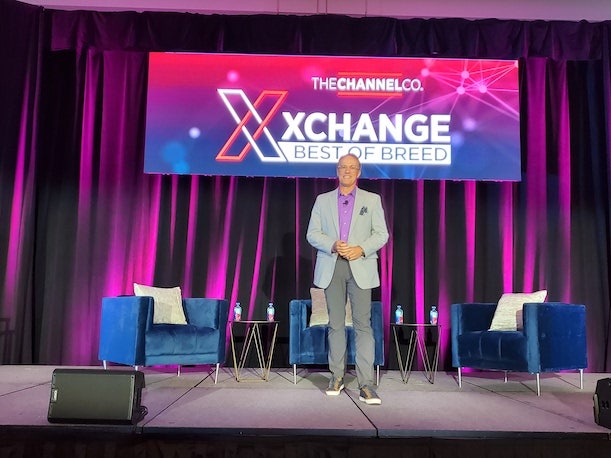GenAI Opportunities, Risks Are Both Surging: Economist
The economy is also facing new ‘X factor’ uncertainties, including the impact of the attacks on Israel, says futurist and former U.S. official Andrew Busch.

The business opportunities associated with generative AI are already massive, and growing fast, less than one year after the debut of OpenAI’s ChatGPT. But so are the risks from an economic standpoint, according to economist Andrew Busch.
“There’s a lot of great things going on with [generative] AI and I’m a firm believer in it. I think it’s fantastic. But wow — we better be a little bit careful about this” said Busch, a futurist and formerly the first chief market intelligence officer of the U.S. government, on Monday.
[Related: GenAI Is A Hit With Hackers. Here’s Why It Will ‘Benefit The Defense’ Even More.]
Busch spoke during a keynote session at the 2023 XChange Best of Breed Conference, hosted by CRN parent The Channel Company in Atlanta.
Addressing an audience of C-level executives at leading solution and service providers, Busch pointed to the huge opportunities to introduce GenAI technologies to sectors that have been slow to adopt it, such as the insurance, energy and leisure/hospitality sectors.
At the same time, there are significant risks posed by ChatGPT and the many GenAI tools that have followed it, he said. The overriding issue, Busch said, is that “there are going to be haves and have nots” with GenAI.
“There will be people losing jobs,” he said. “In case you didn’t know, that’s what the strike of the Hollywood writers was all about.”
Vinod Paul, COO at New York-based Align, No. 217 on CRN’s Solution Provider 500, said that he and his firm primarily see opportunities when it comes to enabling the use of GenAI in his client base of financial investment advisors.
“We’re big believers that AI is absolutely going to shift the marketplace in terms of financial services,” Paul told CRN. “Our clients are engaging us now to say, ‘How can we leverage AI?’”
Align’s customers, he said, are “not necessarily saying, ‘How do we get rid of workforce with AI?’ But they’re asking us, ‘How do we leverage this as a tool to enable our workforce to work smarter, not harder?’”
As part of that, clients are looking to take tasks that are a good fit for automation with GenAI and “have them deployed into doing better, smarter things for those organizations,” Paul said.
During his keynote session, Busch also addressed the growing list of “X factors” — issues that introduce significant uncertainty into the economic outlook. Those include potential scenarios such as China invading Taiwan, Russia using nuclear weapons, cyberwarfare and, most recently, increased concerns over war between Israel and Iran.
“These are all the X factors that are out there that I see that can really derail things for us,” Busch said. “Yes, of course, the attack by Hamas on Israel is one of those things — especially if Iran helped Hamas plan this, that would cause a lot of problems.”
This weekend’s attacks against Israel by Hamas, a Palestinian group that the U.S. has termed a terrorist organization, reportedly killed at least 900. Dozens more, including both soldiers and civilians, were abducted into Gaza. Iran has been known to be a backer of Hamas in the past, and The Wall Street Journal reported that Iranian officials helped to plan the assault on Israel.